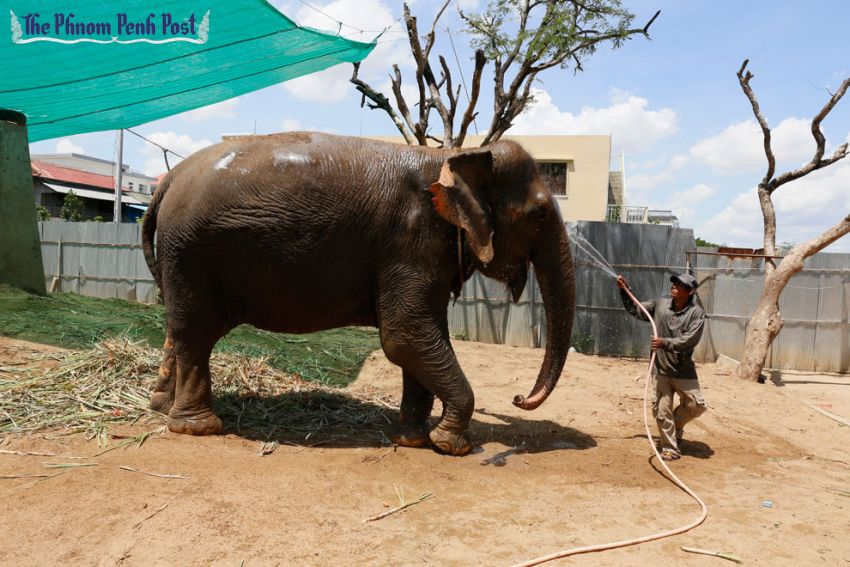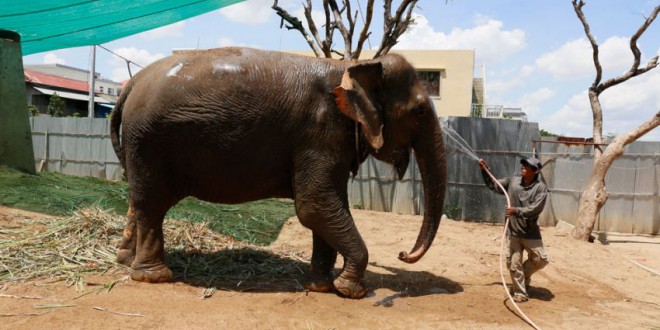
Two years after she was walked out of the city in the middle of the night to a quiet life of retirement on the outskirts of the capital, Sambo, Phnom Penh’s iconic and much-beloved elephant, might soon be back at work entertaining tourists.
With funding for her recently concluded rehabilitation program now gone, her owner is insisting he has little choice but to begin showcasing her once more at Wat Phnom, a decision contested by the elephant rescue organisation that bankrolled her two-year sabbatical.
Sin Sorn, who owns Sambo, says that as the pair are no longer supported by the Elephant Asia Rescue and Survival foundation (EARS), he cannot afford to pay for her food and medical care without the steady income he earned for the more than 20 years that she was a tourist attraction at the temple.
The decades that 54-year-old Sambo spent walking on hard concrete and gravel while giving rides resulted in a painful abscess on a foot, overgrown toenails and a host of other issues, causing her to limp.
After a veterinarian retained by EARS warned in 2012 that a further deterioration in her “painfully lame” condition could lead Sambo to collapse on the city’s streets, Sorn agreed to move her to a plot of land for rest and medical treatment.
That contract expired in March, leaving EARS and Sorn at loggerheads about what happens next.
“I do not have money to support her anymore. I will bring her back to Wat Phnom, but I will not allow people to ride her while she walks like in the past,” Sorn said yesterday at the sandy Phnom Penh Thmey compound where Sambo has lived since February 2012, as the elephant shovelled sugar cane into its mouth behind him.
“I spend $15 a day just on Sambo’s food … [In the city], she will just stand in one place and tourists or people can touch her, take photos with her or buy fruits that I will sell to feed her.”
EARS has spent $45,000 over the two-year period paying for Sambo’s medical care and a monthly compensation package for Sorn to help fund an assistant caregiver, food, electricity and water and to cover his loss of earnings.
Sambo’s feet are in a far better condition than before, but EARS founder and CEO Louise Rogerson says sending her back to the city would be the worst possible decision for the elephant’s welfare.
“She’s never going to fully recover 100 per cent, but what we’ve done is given her an intensive medical program over the last two years,” she said.
“It has been a very slow rehabilitation process, there is absolutely no way she can go back to the city. It would be impossible for her to walk on hot tarmac roads.… It would basically be animal cruelty.”
Sambo the elephant takes a dip as Sin Sorn watches over her on the outskirts of Phnom Penh
Sambo the elephant takes a dip as Sin Sorn watches over her on the outskirts of Phnom Penh. Vireak Mai
EARS has offered to fund Sambo’s retirement at the Phnom Tamao Wildlife Rescue Centre in Takeo province or at the Elephant Valley Project in Mondulkiri province instead, but Sorn has rejected these options.
He says he would prefer to move her to a piece of land in Kampong Speu province that his son has said he will purchase if donors help with her upkeep and medical costs. EARS has rejected that land as unsuitable for the elephant’s long-term retirement.
“I want to appeal to everyone in Cambodia and overseas and other organisations to help my Sambo. But not EARS. I want those who love elephants to help my elephant directly through me, because I am the owner of the elephant and I am taking care of her every day,” Sorn said.
He declined to explain why he no longer wanted any support from EARS, citing “personal issues” with the organisation.
Sorn also brushed off concerns about Sambo’s health and any doubts of his commitment to care for her in the city.
“Sambo has lived with me since she was 8 years old and I consider her my daughter. So I want to stay with Sambo until I die.”
Rogerson is clear, however, that Sambo “deserves a better life after 30 years of standing in the city”.
“He’s pleading poverty and that he can’t afford to feed her, but that’s not the case. We can continue on an agreement if he wants to consider his elephant first and return her to her natural habitat with other elephants,” she said.
Wildlife protection officials from the forestry administration will visit Sambo this week to evaluate her health and determine whether the elephant can return to the city, Phnom Tamao sanctuary director Rattanak Pich said.
The Ministry of Information has also offered its compound on Monivong Boulevard as a possible sleeping place for Sambo if she returns to the city, Minister Khieu Kanharith said.






